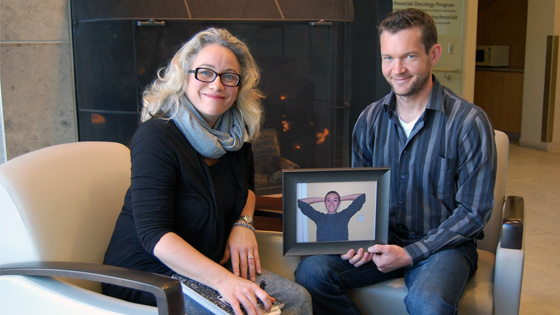
Through the Psychosocial Oncology Program, Social Worker Geneviève Côté (left) continued to counsel Simon Hind even after his wife, Krista Hind (in photo), died from pancreatic cancer.
PSOP celebrates five years
When Marisa Pino received her breast-cancer diagnosis, her world fell apart.
“Each day that passed, my sadness, fear and anxiety were taking control,” said Pino, who has worked at TOH for 27 years, most recently as a grants officer at the Heart Institute. “I didn’t think anybody could help me.”
But then she met Dr. Caroline Gérin-Lajoie, psychiatrist and Medical Lead of TOH’s Psychosocial Oncology Program (PSOP), which was established five years ago based on evidence that the emotional and psychological toll of cancer was affecting patients’ abilities to cope with their diagnosis and treatment.
“It was easy to open up to her. She explained that all these emotions and feelings were normal,” said Pino, whose body has now healed. “I’m living proof that what they do here is important.”
The PSOP team recognizes that, as cancer becomes a chronic rather than terminal illness, they have to treat the person behind the cancer as well, helping patients cope. Their distress can be so severe that it affects their compliance with medical appointments and treatment, which can then impact their outcome.
“Cancer care is more than treatment for the tumour,” said Diane Manii, PSOP Manager. “It’s also the most fiscally responsible thing to do.”
Research shows that highly distressed cancer patients lead to higher health costs because they spend more time in emergency departments, stay in hospital longer and are at higher risk of depression and even suicide. Bringing in a team of social workers, psychologists and psychiatrists early in a diagnosis can help patients cope with the stresses and better manage the symptoms and pain related to cancer treatments.
“Working with PSOP was one of the bright points of going through the cancer journey,” said Simon Hind, who received individual and couples counselling from Social Worker Geneviève Côté after his wife, Krista Hind (a researcher at OHRI), was diagnosed with pancreatic cancer. “We always left happier than when we arrived.”
But 15 months later, Krista passed away. Hind was devastated, but grateful that Côté continued to counsel him. If he had had to start over with someone outside the program, he probably wouldn’t have done so.
“It’s an absolutely critical service,” said Hind. “It helped Krista live and pass more comfortably and then helped me piece my life back together. I can’t say enough good things about this place.”
Pino’s son, Matteo, said he was so happy and impressed by how his mom’s physicians took care of her, that he’s been inspired to study medicine and one day become a surgeon.
At a recent celebration for PSOP’s five-year anniversary, Dr. Jack Kitts, TOH’s President and CEO, said the program helps keep families together through the cancer journey.
“You offer cancer patients hope,” said Dr. Kitts. “That’s what this program is all about.”

Support patient care and research at
The Ottawa Hospital


 To reset, hold the Ctrl key, then press 0.
To reset, hold the Ctrl key, then press 0.